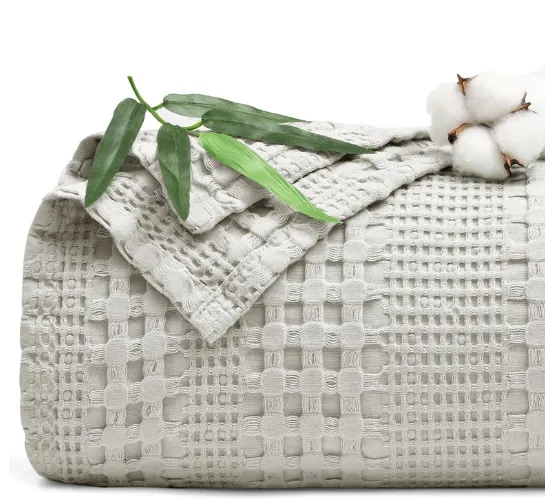Bamboo Fabric Products: A New Choice for Sustainable Development
May . 15, 2025 11:04 Back to list
Bamboo Fabric Products: A New Choice for Sustainable Development
Against the backdrop of increasing emphasis on environmental protection and sustainable development, Bamboo Fabric Products has gradually entered the public eye with its unique advantages. Bamboo Fabric Products is not a new type of synthetic fiber, but rather cellulose fibers extracted from bamboo and processed through special techniques. It combines the comfort and environmental friendliness of natural fibers, as well as some excellent characteristics beyond traditional natural fibers, making it have broad application prospects in fields such as textiles and daily necessities.

The biggest advantage of Bamboo Fabric Products is the sustainability of its raw materials
Bamboo grows rapidly, does not require a large amount of pesticides and fertilizers, has low dependence on land, and can effectively reduce environmental pollution. Compared to traditional textile materials such as cotton, the planting and harvesting process of bamboo is more environmentally friendly and in line with the concept of sustainable development. In addition, bamboo itself has antibacterial and bacteriostatic properties, which makes bamboo fabric by the yard naturally have certain antibacterial functions, reducing the dependence on chemical antibacterial agents.
Bamboo Fabric Products also excels in comfort
Its fiber surface is smooth, the structure is fluffy and porous, and it has good moisture absorption and breathability. Clothes made with bamboo cloth have a soft and comfortable touch, effectively absorbing sweat and keeping the skin dry, especially suitable for wearing in hot and humid environments. In addition, Bamboo Fabric Products also has excellent UV resistance, which can effectively protect the skin from UV damage.
The development of Bamboo Fabric Products also faces some challenges
At present, the quality of bamboo textile on the market varies greatly, and some products may use chemical treatment processes, which greatly reduces the environmental and natural properties of the fibers. Therefore, when purchasing Bamboo Fabric Products, consumers should pay attention to choosing reputable brands and products that have been certified by authorities to ensure their true environmental friendliness and safety.
In addition, the production cost of custom bamboo fabric is relatively high, which is also a factor restricting its further popularization. How to reduce production costs and improve the cost-effectiveness of Bamboo Fabric Products is an important issue for the development of the industry. Effective cost control can be achieved through technological innovation, optimization of production processes, and improvement of raw material utilization.
In summary, Bamboo Fabric Products, as a natural fiber product with sustainable development potential, has significant advantages in environmental protection, comfort, and health. With the increasing awareness of environmental protection among consumers and the continuous advancement of technology, Bamboo Fabric Products will undoubtedly occupy an increasingly important position in the future market, providing people with more environmentally friendly, comfortable, and healthy living choices. We need to regulate the market, strengthen supervision, and guide the healthy development of the industry in order to truly unleash the sustainable development potential of Bamboo Fabric Products and contribute to environmental protection.
Bamboo Fabric Products FAQs
What is Baobo Fabric?
Bamboo Fabric Products are textiles made from bamboo processed into two main types:
Bamboo fiber (natural Bamboo Fabric Products, mechanically extracted, rougher, similar to flax).
Regenerated Bamboo Fabric Products (spun after chemical dissolution, similar to adhesive, soft as cotton).
The common products on the market are recycled Bamboo Fabric Products (such as bamboo pulp fibers or Modal Bamboo Fabric Products).
What are the advantages of Bamboo Fabric Products?
Super soft: with a touch similar to silk or cashmere, suitable for close fitting clothing.
Breathable and moisture absorbing: Its water absorption is 3-4 times that of cotton, suitable for summer and sportswear.
Natural antibacterial: Bamboo ketone alcohol can inhibit bacteria and odors.
Environmental potential: Bamboo grows quickly and requires less water and pesticides (but processing methods affect environmental friendliness).
What are the common Bamboo Fabric products?
Clothing: Underwear, socks, T-shirts, home clothes, baby clothes.
Home textiles: bed sheets, towels, bathrobes, blankets.
Other: medical gauze, eco-friendly masks, reusable shopping bags.
What are the drawbacks of Bamboo Fabric Products?
Low durability: prone to pilling or thinning after multiple washes (especially for recycled Bamboo Fabric Products).
Chemical processing controversy: Some recycled Bamboo Fabric Products use adhesive methods, which may involve harmful solvents (choosing environmentally certified brands can avoid them).
High price: More expensive than ordinary cotton products, but lower than high-end natural materials such as organic cotton or silk.
How to maintain Bamboo Fabric Products?
Washing: Hand wash in cold water or gently machine wash, avoid bleach.
Drying: Lay flat in a cool place to dry, avoiding direct sunlight (UV rays can weaken fibers).
Ironing: Low temperature steam ironing (high temperature may damage fibers).
-
Wholesale Custom Pure Linen Womens Halter Top Shirts&Pajamas
NewsNov.17,2025
-
Indian Block Print Napkins | Factory Direct OEM/ODM
NewsNov.17,2025
-
Printed Cloth Napkin – Custom Designs, Bulk & Wedding Ready
NewsNov.10,2025
-
Indian Block Print Napkins – Handmade, Wholesale, OEM/ODM
NewsNov.10,2025
-
OEKO Bamboo Bedding Set: Cooling, Hypoallergenic Comfort
NewsNov.10,2025
-
Indian Block Print Napkins – Handcrafted Linen, Wholesale
NewsNov.10,2025
